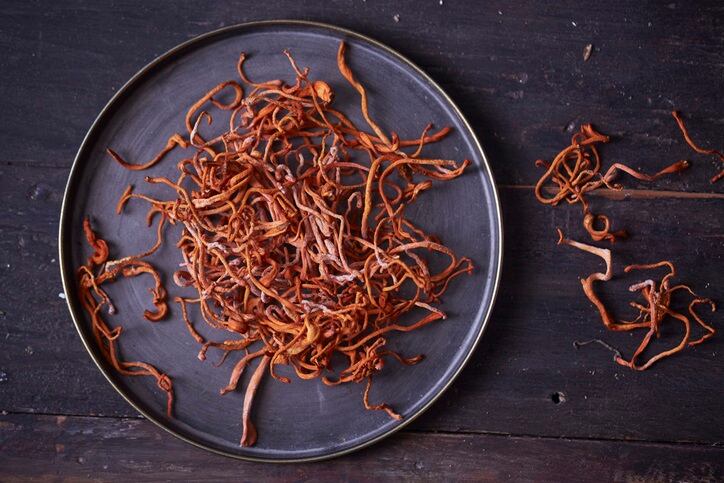Since 2020, Mallipathra Nutraceutical has been selling FSSAI-certified nutraceuticals that come in the form of capsules and powder both online and offline.
Examples include Malli’s Cordycep Capsule and Malli’s Cordycep Infusion, which can be drank as a powdered tea.
These products are sold online and also in brick-and-mortar stores spanning across organic food stores, supermarkets, ayurvedic hospitals and clinics.
A common ingredient of Traditional Chinese Medicine (TCM), cordyceps have been shown to regulate blood pressure, blood sugar, and enhance stamina.
However, within India, cordyceps is lesser known as compared to the likes of curcumin and brahmi – also known as Bacopa monnieri.
The company hopes to popularise the use of cordyceps among the Ayurveda healthcare practitioners.
So far, it has cultivated more than 20 different strains of cordyceps from the Himalayans. The cordyceps are either cultivated on insects or a vegetable medium – which is meant to cater to the large vegetarian population in India.
Speaking to NutraIngredients-Asia, Dr. Mousumi Mondal, founder and director, said that the firm’s strategy was to incorporate cordyceps with traditionally popular botanicals and spices used in India, including ashwagandha and brahmi.
“We are working on products with synergistic effects. For example, we are developing cordyceps and Brahmi which is good for the brain, into a functional food for the kids and also the geriatric population,” she said.
In February, the company will be expanding their cordyceps nutrition product range with health drinks, cookies, and sports nutrition.
The company also combines different strains of cordyceps in its development of new nutraceuticals and functional foods.
For instance, the amount of bioactives cordycepic acid and cordycepin are higher in cordyceps cultivated in silkworms as compared to those cultivated in a vegetable medium. The firm can thus make use of the differences in these cordyceps to develop different products.
To expand among the Ayurveda community, more education on the benefits of cordyceps will need to be done.
“Commonly asked questions include how will cordyceps benefit me and we can understand that.”
Based on animal model safety studies, Dr. Mondal said it was found that consuming six grams of cordyceps per day was within the safe limits.
Technology
Of interest is the company’s technology that could manufacture finished products using cordyceps mushroom cultivated on both insects and vegetable medium in 60 days – only one-sixth of the amount of time required usually.
In the wild, it takes around 365 days to cultivate cordyceps.
The firm’s technology provides conditions that are most suitable for cordyceps cultivation, taking care of factors such as the level of humidity and moisture.
Whereas in the wild, cordyceps will need to go through the four seasons and thus a longer time to maturation, Dr. Mondal explained.
Not only is the company able to reduce the amount of time, it also claimed that it could enhance the benefit of the cordyceps mushroom by increasing the amount of bioactives, such as cordycepic acid and cordycepin.
Recently, the company took home the National Startup Awards 2022 announced during the Startup India Innovation week that happened between January 10 and 16.
A total of six companies within the health and wellness sector was awarded the accolade.
Expanding capabilities
The company is in the midst of ramping up its cordyceps production from 25kg per month to 28kg per day.
The medicinal mushroom currently costs four to five lakhs rupees per kg, equivalent to US$4,900 to US$6,100, Dr. Mondal said.
An industrial plot was purchased to scale up the firm’s production.



